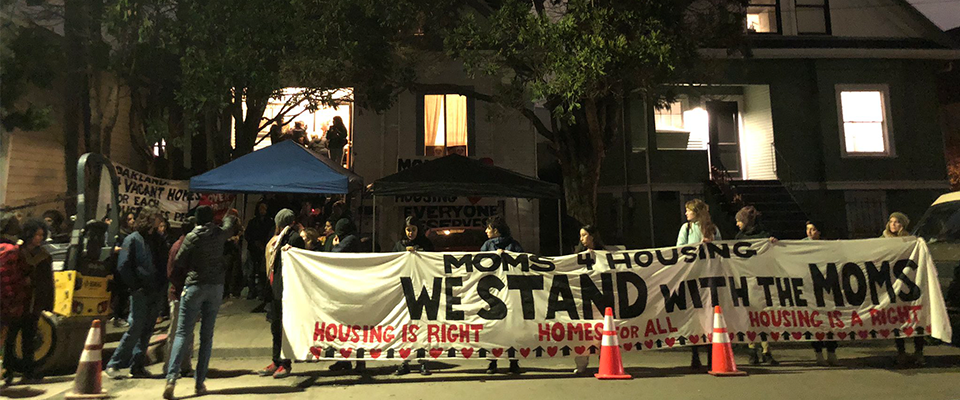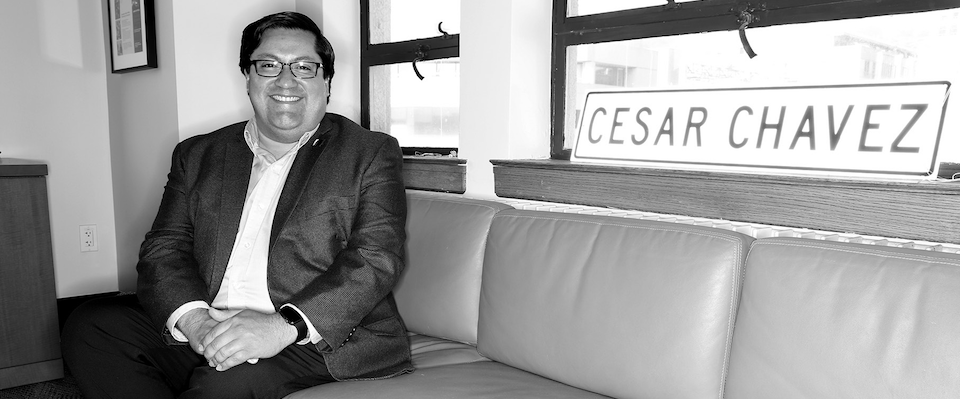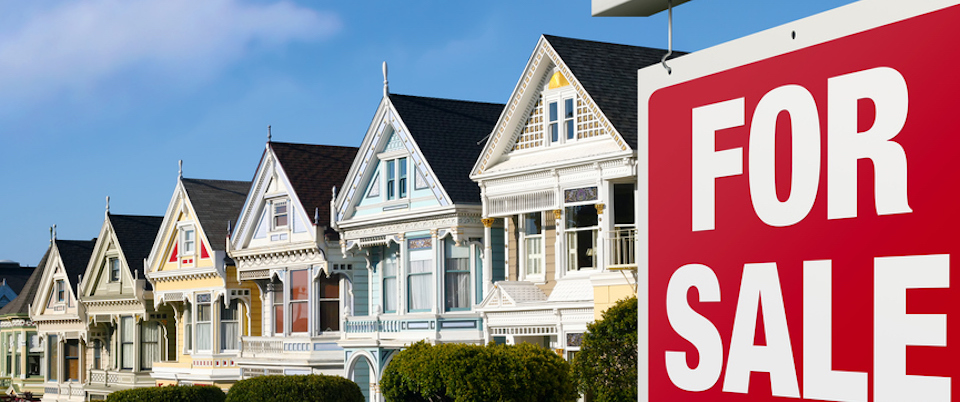On November 18, 2019, Dominique Walker and Sameerah Karim moved with their children into an unlocked, vacant house on Magnolia Street in West Oakland. They had been housing insecure for months, moving from place to place, often in hotels which one of the Moms, Misty Cross, described as “Very unsafe for young girls, which I have three of.” But it was also an occupation meant to draw attention to the city’s failure to combat the growing housing crisis.
The house was owned by Wedgewood Properties, a real estate company that had purchased it out of foreclosure in August. The company, a home-flipping operation in a city where there are four vacant units for every homeless person, owns about 125 houses across the Bay Area. The women call it a “displacement machine.”
Over the next few months, the group took on the name Moms 4 Housing. They furnished the house and slept there, sometimes with volunteer security guards. “My son took his first steps, and said his first words, in that house,” Walker said. They were always clear that their occupation was not a theft. They intended to buy the house. The company refused, but offered to pay for their move and two months of rent in a Catholic shelter if the women left. But the Moms remained on the property even after Alameda County ordered them to leave. On January 14, at dawn, heavily armed officers entered their home and arrested them.
Despite recent setbacks, the women of Moms 4 Housing are determined to stay. Walker’s grandparents, fleeing the KKK, first moved to Oakland in the 1950s and set up businesses. “This city has a rich history of resistance and Black culture,” she said. “I love this city and we deserve to be here.”
“It’s easy for people to say, ‘Just move where you can afford,’” Cross said. “But when you put your blood, sweat, and tears into something, it’s deeper.” Aside from their own occupation, the Moms have been advocating for affordable housing elsewhere in Oakland as well. Last month, they helped lead protests against SB50, a controversial housing bill that aims to increase density through largely market rate units; most protesters, including the Moms, have argued that the advantages of market rate housing will not trickle down, and that this bill will not increase access to affordable housing.
After the national uproar that the eviction caused, the real estate company verbally agreed to let the Moms buy the house through Oakland’s Community Land Trust. But it was never just about a house. “We knew that from the beginning this was bigger than us,” Cross said at a press conference on Martin Luther King Day, while the three Moms representing the group took turns holding and consoling a child. “This is about building a movement.”
Chris Herring knows about these movements. A doctoral student of Sociology at UC Berkeley, Herring focuses on urban poverty and housing. He has studied and written, among other things, about the chronic criminalization of the poor or homeless in San Francisco through legal and political efforts, and the emergence of large-scale homeless encampments since the 1990s. He has lived on the streets and in shelters along with those experiencing homelessness, and has worked with the city of San Francisco to understand the various efforts in place to address the issue. California magazine spoke to him about the broader issue of housing in the Bay Area, and how the Moms 4 Housing movement fits into it.
This conversation has been edited for length and clarity.
How does the Moms 4 Housing effort fit into the current political debate around homelessness?
I think [the Moms] pointed to something that the city could have done. One of their demands was to take some of these vacant houses, which have been sitting for years owned by corporations, off the market and put them into a land trust. That is something the city could do, and they could have more laws that make it more costly to hold land speculatively—like increasing land taxes, so that you don’t have these houses sitting empty on the market. Also, this doesn’t circulate much in the US, but I believe in some European contexts and definitely in the global south, there’s rights granted to squatters who are taking over buildings that have been neglected or unused for a certain amount of time. It’s not necessarily something we consider in US policy circles, but as far as our political imagination, there’s definitely a different sort of politics where the cities side with the people who are occupying and utilizing the land for a positive social use, against the corporations that are holding it hostage.
Do you see any similarities between the Moms and the people you’ve lived and worked with in encampments?
I think you could connect Moms 4 Housing and what they were doing with that house, to what happened a year before in Oakland, around January of last year. There was an encampment led by homeless mothers on a parcel of land in Oakland. It was like what the Moms 4 Housing were doing in the house except in an Oakland park. And just like Moms 4 Housing, they had the support of a lot of the local neighbors. The group of campers took better care of the land in order to utilize it, and were being good neighbors. And they were politically organized—when the city came to say, “You have to move,” the lawyers got an injunction saying that was violating the [Supreme Court’s] Martin v. Boise decision, which ruled that it was “cruel and unusual punishment” to arrest or give a citation to a homeless person if there’s no adequate shelter available.
Of course the city came back and offered all of these women shelter—and this is what you also saw with Moms 4 Housing. When they were put into the police car, after the eviction, the first thing they were given was papers saying that they were going to get shelter; this is the workaround that [the city] found. Even though there are hundreds of people waiting on shelter lists, as long as you’re able to offer a bed to the person being evicted, that’s the legal understanding of what’s going on. At that camp, when the city came to evict them, the people said, “Why are you fast tracking us to the shelter? What about all the other people out on the street?”
Moms 4 Housing is a political movement to shine light on the inadequacy of the city in not being able to provide shelter or housing. They were all given an option to be housed somewhere much nicer if they didn’t go through with the eviction. It’s the same thing with a lot of these encampments. When you’re resolving them you give them some sweet deal that pays them off for a month or two.
As for the Alameda County judge’s decisions to evict the Moms, and then to allow them to buy the house—is it possible this will set a precedent?
Well, Moms 4 Housing got their house. But what’s next? They were very clear that they were trying to start a movement, and I’m curious how they could mobilize. The last time I remember this picking up in a broader way was during the mortgage foreclosure crisis, where you had groups take back the land, and where I think this was much more widespread. There was a clear political prerogative around it. I think Moms 4 Housing laid out a pretty good political case, but we’ll have to wait and see. I’m pretty cynical in the American context, though, because [such movements are] usually squashed so quickly. The fact that they were able to stay so long was because—I mean, look at their story: Mothers moving in there with their children. If this was a lot of different other groups, we would have never heard about it in the media. It’s very difficult for organizers to find people who are willing to go forward. There are so many risks for many people in this community who have criminal records or warrants, and it’s very hard for poor folks who are just trying to survive day to day to get organized.
I hope people will see this as a hopeful potential for more of a movement around family homelessness, which doesn’t get enough attention. I believe about 25% of homeless folks are homeless as a family, and we don’t talk about it that much. We’re also the only wealthy, developed country that I know of where, if you’re found homeless on the street with your children, the more likely outcome is that your children will be taken by the state and put in foster care by child protection services—rather than you being given a house. This pushes people into the shadows; this is why family homelessness remains so hidden. People will spend extraordinary amounts of money just to get a hotel room every night, because they want to continue being with their children. Look at numbers from the [Department of Education], which asked students in classrooms, “Have you experienced homeless in the last year?” The numbers came out one or two years ago. They’re extraordinarily high, and these are people who aren’t counted in the homeless counts because they are often doubled-up with friends or family, living in vehicles, motels, or if they are sleeping outside, hiding.
To situate what’s happening now, can you give us some context for laws that have made housing less affordable?
There are a number of laws that are associated with higher housing costs. Zoning restrictions are in place in a lot of Oakland, restrictions on density—how much you can build, especially areas that are built for single family housing—which obviously increases costs of multi-unit, multi-family apartments.
But affordability for whom is the question. Moms 4 Housing stood up to protest SB50 [a state measure that would have rolled back restrictions on denser housing in urban transit areas] a day before they were evicted, and the argument there—which I think is not without credit—is in these wealthy cities, if you change the zoning to allow for multi-unit structures, the main thing that is going to be built is luxury housing, and that is not going to trickle down. There are a lot of studies in housing economics that show that housing markets are pretty tiered. SB50 might lower the prices of luxury housing and even middle class housing, but not affordable housing. One thing that [the Moms] were very good at pointing out is that there is enough housing already, it’s just not the right kind of housing, it’s not affordable. Now that the Bay Area is at the center of venture capital…there’s big demand for just moving in. That means that housing is not going to go to the people [already] here, and it could very well end up pushing people here out.
The measures that make building housing more expensive affect multi-unit, lower-cost housing more than luxury housing. Why is that?
Historically it was very much to keep out poor people. Single family homes were upper middle class, especially in the 1950s with white flight in suburbia, so if you wanted to keep poor people out of your neighborhoods, you built everything for single families. The people able to get the financing were all white people. That’s why we have suburban sprawl.
Apple recently pledged a few billion dollars to help combat the housing crisis in California Do you think big tech companies can in good faith be in a position to address this issue?
My understanding is that they’re giving that much money in loans. They’re going to make a profit off of that money—they’re just going to make less of a profit because [of] lower interest rates. So no, it’s totally inadequate. These are the ones who are largely fueling the housing crisis, and they pay barely any taxes.
We used to fund and provide for housing before Nixon, and that matches more of the plans we’re starting to see from people like Senators Warren and Sanders, who are talking about building 10 million units of affordable housing through federal funding. Having states become more involved in affordable housing construction, we could actually do more.





















